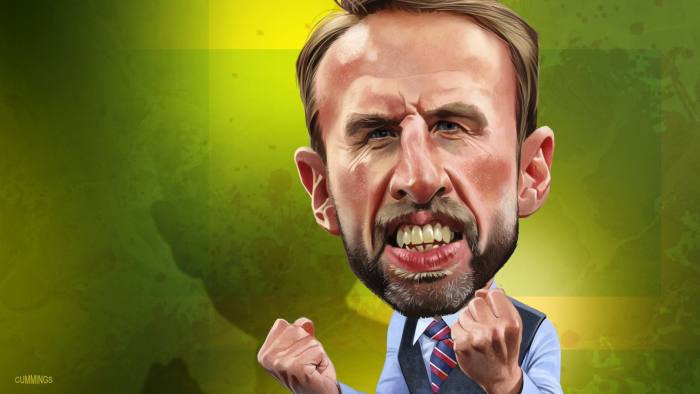Gareth Southgate, a coach to banish England’s football demons
The manager has shaped a young squad and broken old dogmas to make history
Murad Ahmed

Wembley Stadium, London, 1996. Gareth Southgate gathers the ball, places it on the spot, then backs away. England’s central defender is taking a penalty kick during a shootout against Germany in the European Championship semi-final.
He wants the ordeal over quickly. At the referee’s whistle, he sprints forward, kicking low and to the left. German keeper Andreas Köpke palms the ball away with ease. Southgate has only taken one penalty previously in a professional match. That one was also saved. This failure is decisive. England lose the shootout.
The team would not win another in a major tournament for 22 years — until this week, when England, now led by Southgate as its manager, beat Colombia on penalties in the World Cup. They now move to the quarter-finals where they will face Sweden on Saturday.
“We’ve spoken to the players about writing their own stories,” Southgate told reporters at the Spartak Stadium in Moscow after the Colombia match. “Tonight, they showed they don’t have to conform to what’s gone before. They have created their own history.”
Southgate was born in 1970 to middle-class parents who lived in Crawley, West Sussex. In a working-class sport, he was considered a “posh boy” by teammates in the youth ranks at Crystal Palace, the London-based Premier League football club that he joined aged 14.
His coaches from that time have suggested his contemporaries displayed more flair and talent, but less diligence and work ethic. After turning professional, he became a trustworthy, if unspectacular, centre back at Palace, Aston Villa and Middlesbrough. He played for his country 57 times, a disciplined defensive player his teammates could rely on. In 1996, he volunteered to take a penalty when many of England’s attacking stars shied away from the responsibility.
These early experiences may have served him well during the frequent ignominies that befall football coaches. His reputation was damaged as manager of Middlesbrough, leading the side to relegation to the Championship, the second tier of English football, in 2009. He was fired shortly afterwards.
In 2013, he was appointed manager of England’s under-21s, where he was able to work under less scrutiny than at a big club. There, he helped to enact a quiet revolution. In 2014, he was instrumental in an ambitious initiative by the Football Association, the national governing body for the sport, to transform the fortunes of the England team.
The FA instituted the “England DNA” programme, training its youth teams to play the passing and progressive style of football expected of the senior squad. Players of all ages were to be coached on a set of shared principles.
One of these is “look up, play forward,” says Matt Crocker, the FA’s head of development team coaching. “There is a simple consistency across our teams and the players have more confidence when they step up to the seniors. I really think we have more connected squads than ever before.”
The approach was a response to England’s repeated failures at major tournaments. Other nations, such as Spain and Germany, have used their national youth systems to develop stylish and technically-gifted footballers who graduated into world champions. But the FA blinked when first asked to put the theory into practice. After the 2016 European Championships, when the England team plummeted to a historic low, losing to Iceland, Southgate was overlooked in favour of Sam Allardyce for the position of England manager.
Allardyce, an experienced club coach, was considered a safer, battle-hardened choice. He lasted just one match in charge, before being caught in a newspaper sting, in which he appeared to advise undercover journalists on ways to circumvent the FA’s transfer rules. Allardyce denied wrongdoing, but resigned and Southgate was promoted to the top job. Expectations for success had never been lower. A bitterly disappointed football public had fallen out of love with the team.
Quietly, Southgate continued the revolution. For this World Cup, he picked the least experienced squad since 2000, but one stacked with players who had played together in England’s youth ranks once under his guidance. He is transforming the English footballing DNA, enacting a fluid and complex 3-5-2 formation, and casting aside the decades-old reliance on simple but rigid 4-4-2. He encourages attacking play based around short, diagonal passes, rather than hoofing long balls forward and relying on bulldog spirit in defence.
He has also broken with other dogmas. Past England teams have not systematically practised penalties before tournaments, believing it impossible to replicate the pressure of a shootout in a real match. Since March, the manager has had players simulating the lonely walk from the halfway line before a spot kick. Players have been advised to slow down and have faith they can execute a skill practised hundreds of times before.
On Tuesday night, midfielder Eric Dier gathered the ball, placed it on the spot and backed away. As the referee blew his whistle, he waited a moment, steadied himself, then shot low and to the left. Colombian goalkeeper David Ospina brushed the ball with his fingers as it flew into the net. England had won its first ever shootout at a World Cup. On the sidelines, Southgate screamed with delight, as a personal and national hoodoo vanished into the Moscow night.
0 comments:
Publicar un comentario